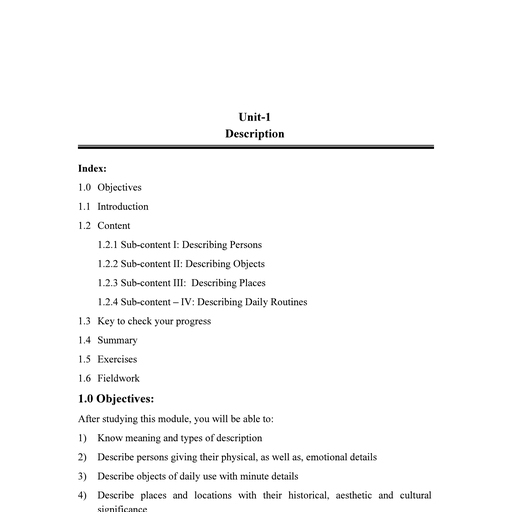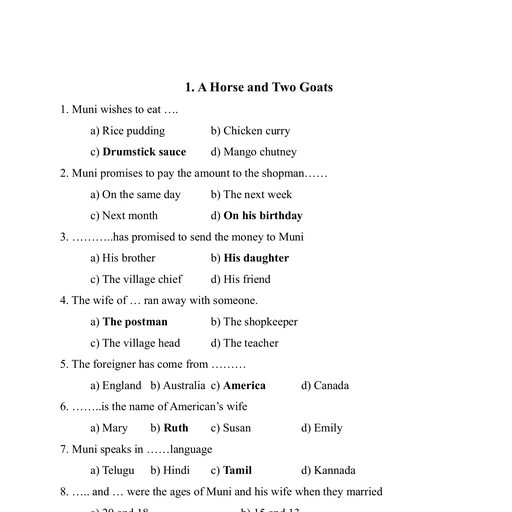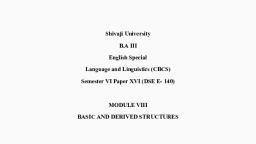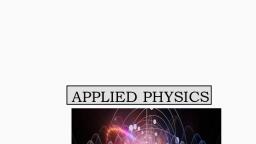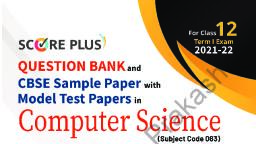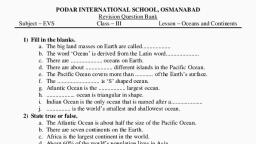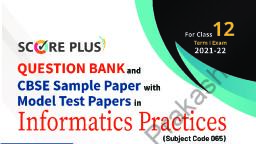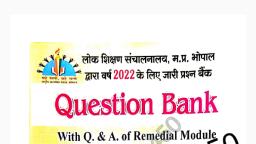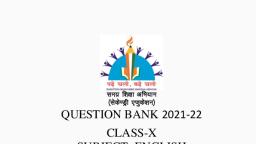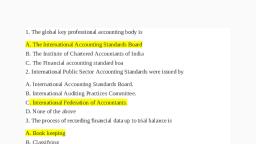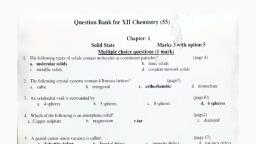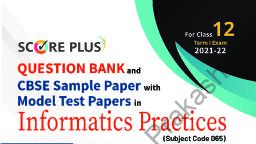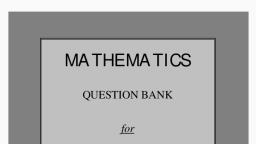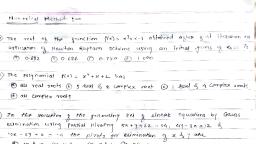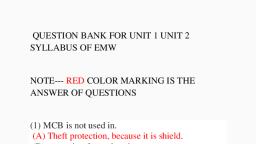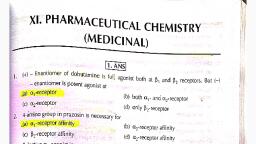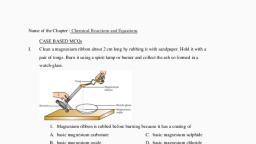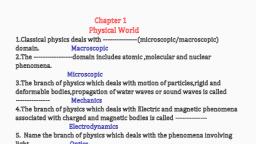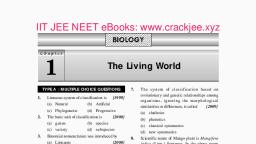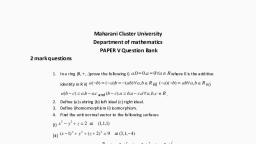Page 1 :
B. A. (PART - III) Test II & (SEMESTER - VI): 2020-21, Paper No. XVI: Language and Linguistics (CBCS), , ==========================================================, , Module V: PHRASES, =============================================, Q. I. Complete the following sentences by choosing the correct alternatives:, 1) Main phrase is a ____________ of a clause, a) Indirect Constituent, b) Direct Constituent, c) Intermediate unit, d) Constituent of word, 2) In the NP, the head word is always _ _ _ _ _ _ _ _ _ _, a) Verb, b) Adjective, c) Adverb, d) Noun, 3) In the Noun phrase, (Awful Climate), Awful is _ _ _ _ _ _ _ _, a) Post modifier, b) Determiner, c) Pre modifier, d) Head word, 4) Noun Phrase functions as_______________ in clause., a) S, P, O, b) S, O, A, c) S, O, C, A, d) S, Oi, Od, 5) Prepositional phrase always functions as____________ in clause., a) Subject, b) Object, c) Preposition, d) Adverbial, , 1
Page 2 :
6) Identify the adverb phrase in the sentence--“He ran very fast in the Olympic.”, a) Ran, b) Very, c) Very fast, d) In the Olympic, 7) Identify the functional label of ‘up’ in the sentence—“He went up.”, a) Object, b) Adverbial, c) Adjective, d) Complement, , Q. II Identify form and functional labels of the underlined phrases. (Q. No. 8 to 12), 8) Ashok’s was the only correct answer., M, , a) ( ( Ahok’s ), NP GP, , P, , b) ( Ashok’s), VP, , A, , c) ( Ashok’s), AvP, , O, , d) (Ashok’s), NP, , 9) It is rather very expensive, C, , a) ( Expensive), NP, , C, , b) (Expensive), AjP, M, , c) (Expensive), GP, , A, , d) (Expensive), AvP, , 2
Page 3 :
10) I work in the college library., M, , a) (In the college library), GP, , A, , b) (In the college library), PP, A, , c) (In the college library), AvP, C, , d) (In the college library), NP, , 11) Bring me a glass of water., P, , a) (a glass of water), VP, M, , b) (a glass of water), AjP, , A, , c) ( a glass of water), AvP, O, , d) ( ( a glass of water), NP PP, , 12) The election took place last month., A, , a) ( last month ), AvP, C, , b) ( last month ), NP, , A, , c) ( last month ), PP, H, , d) ( last month), GP, , ., 3
Page 4 :
===================================================, , Module VI: CLAUSES, =============================================, Q.I A] Identify the clause elements of underlined words in the following sentences., (Questions: 1 to 14), , 1) He can’t write properly., a) Object (O), b) Subject (S), c) Adverbial (A), d) Complement (C), 2) He is a gentleman., a) Complement (C), b) Subject (S), c) Adverbial (A), d) Predicate (P), 3) The train arrived late., a) c) Adverbial (A), b) Object (O), c) Adverbial (A), d) Predicate (P), 4) They like Classical Hindi Songs., a) Complement (C), b) Predicate (P), c) Adverbial (A), d) Object (O), 5) He patted him on the back., a) Predicate (P), b) Subject (S), c) Adverbial (A), d) Object (O), 6) The mother gave her daughter a ring., a) Indirect Object (Oi), b) Subject (S), c) Adverbial (A), d) Complement (C), , 4
Page 5 :
7) The bus came late., a) Object (O), b) Subject (S), c) Adverbial (A), d) Complement (C), 8) They elected him the chairman of the board., a) Subject (S), b) Object (O), c) Adverbial (A), d) Complement (C), 9) My father purchased a new car yesterday., a) Object (O), b) Subject (S), c) Adverbial (A), d) Predicate (P), 10) The Narcotics Control Bureau has summoned the film stars for interrogation,, a) Object (O), b) Subject (S), c) Adverbial (A), d) Predicate (P), Unit—5 Clauses: Continued, , 11) Ayesha sang and danced at the concert., a) Object (O), b) Compound Predicate (P), c) Adverbial (A), d) Complement (C), 12) She does not speak English fluently., a) Complement (S), b) Adverbial (A), c) Predicate (P), d) Complement (C), 13) My mother bought me a new shirt., a) Direct Object (Od), b) Subject (S), c) Adverbial (A), d) Complement (C), 14) Many children like biscuits., a) Predicate (P), b) Adverbial (A), c) Object (O), d) Complement (C), 5
Page 6 :
Q, 1B] Identify the basic clause patterns of the following sentences. (Questions: 1 to 15), 1) [(Birds) (fly)]., a) [S P], b) [S A], c)[SC], d) [PA], , 2) [ (He) (painted) (the box) (red). ], a) [S P Od A], b) [S P C A], c) [S P OiOd ], d) [S P Od C], 3) [ ( I ) ( accept ) ( your proposal ) ], a) [S P Od], b) [S P C ], c)[ P Od S], d) [S P A ], 4) [(He) (purchased) (a new bungalow) (yesterday)]., a) [S P OdA], b) [S P COd ], c)[ S P OdC], d) [S P A Od], 5) [(They) (called) (him) (a gentleman)]., a) [S P Oi A], b) [S P OdC], c)[P S Oi C], d) [S P A C], 6) [ (The bus) (reached) (very late) ]., a) [S P Od], b) [S P C], c)[ P Od S], d) [S P A], 7) [(They teacher) (gave), a) [S P Oi A], b) [S P C A], c) [S P OiOd], d) [S P Od C], , (her), , (a grammar book)]., , 6
Page 7 :
8) [ (My father) (is) (a university professor) ]., a) [S P O], b) [S P C], c)[P O S], d) [S P A], 9) [(She) (speaks) (English) (confidently)]., a) [S P Od A], b) [S P C A], c) [S P Oi Od], d) [S P Od C], Unit—5 Clauses: Continued, , 10) [ (He) (is doing) (research) ]., a) [S P O], b) [S P C], c)[P O S], d) [S P A], 11) [(The boy) (in the garden), a) [S P Od], b) [S P C], c)[P Od S], d) [S AP], , (is weeping)]., , 12) [(The test) (has been postponed)]., a) [S P], b) [S C], c) [SOd], d) [S A], 13) [ (I) (love) (English Grammar)]., a) [S P C], b) [C S P], c) [S P Od], d) [S OdA], 14) [ (The child) (put) (the toy) (in the box)]., a) [S P Od A], b) [S P AC], c) [P S A C], d) [S Od A C], , 7
Page 8 :
15) [ (He) (is) (a gentleman)]., a) [S P C], b) [C S P], c) [S P A], d) [S Od A], , Q.1 C) Choose the correct option to complete the statement.(Questions: 1- 5), 1) The sentence, ‘Is your daughter in our school?’ is a/an, a) Exclamatory, b) Imperative, c) Yes/No Interrogative, d) Declarative, , clause., , 2) ‘Ram will dispatch the letters’ is an example of, a) Exclamatory, b) Imperative, c) Yes/No Interrogative, d) Declarative, 3) The statement, ‘Where is he going?’ is a/an, a)Yes/No Interrogative, b) Imperative, c) Declarative, d) Wh-Interrogative, , clause., , clause., , 4) ‘Go to college today.’ is an example of, a) Exclamatory, b) Imperative, c) Yes/No Interrogative, d) Declarative, , _clause., , 5) The sentence, ‘Research was being done by him’ is an example of, a) Passive, b) Imperative, c) Exclamatory, d) Active, , clause., , Q. 1 D) Choose the correct option to complete the statement. (Questions: 1-18), 1. A clause is a higher unit made up of, a) Phrases, b) Symbols, c) Signs, d) Language, , ., , 8
Page 9 :
2) The principal elements of the clause are, a) SYMBOLS, b) SPOCA, c) WORDS, d) PHRASES, 3) Substitution is also known as, a) Speech, b) Transfer, c) Sound, d) Replacement, types., 4) Complements are of, a) Two, b) Four, c) Three, d) Eight, , ., , test., , 5) Which of the following elements is mobile in the clause?, a) Adverbial, b) Subject, c) Object, d) Predicate, 6) The most basic form of the clause is, a) Imperative, b) Interrogative, c) Declarative, d) Active, , _., , 7) The function of declarative clause is to, a) Requests, b) Make statements, c) Ask questions, d) Give orders, 8) The more marked form of the clause is, a) Declarative, b) Active voice, c) Imperative, d) Passive voice, 9) The function of interrogative clause is to, a) Make requests, b) Make statements, c) Ask questions, d) Give orders, , _., , _., , ., , 9
Page 10 :
10) Interrogative clauses are of, a) Three, b) Four, c) Two, d) Six, , types., , 11) The function of imperative clause is to, a) Make requests/give orders, b) Make statements, c) Ask questions, d) Make exclamation, 12) A finite verb always shows, a) tense and subject, b) subject and verb, c) adverb and verb, d) subject and subject, , _., , concord., , Unit—5 Clauses: Continued, , 13) In a non-finite VP the exact, a) Adverb, b) Tense form, c) Subject, d) Object, , is not identified., , 14) Subordination means joining of two or more clauses by, a) Subordinating conjunctions, b) Coordinating conjunctions, c) Using prepositions, d) Using verbs, 15) Coordination means joining of two or more clauses by, a) Subordinating conjunctions, b) Coordinating conjunctions, c) Using prepositions, d) Using verbs, 16) Operator Verb in the sentence, a) First, b) Second, c) Third, d) Fourth, , ., , ., , auxiliary verb in the VP., , 10
Page 11 :
17) Which among the following are the two types of compliments?, a) Adjective and Verb Compliments, b) Adverb and Preposition Compliments, c) Subject and Object Compliments, d) None of these, 18) One independent clause is joined with another independent clause is known as ------ --., a) Subordinate clause, b) Simple clause, c) Coordinate clause, d) Mood, ===================================================================, , Module VII: Subordination and Coordination --- Deleted from the syllabus due, Corona Pandemic, , ==========================================================, , =============================================, Module VIII: DERIVED STRUCTURES, i) Inversion/ Fronting, ii) Omission of Certain Elements (Relative Pronouns,, Comparative Clauses, Tag Questions), iii) Passivisation, iv) Interrogation,, vi) Negation, , =============================================, i) Inversion/ Fronting (Qs. 1 to 30), 1) As compared to Marathi, the basic order in English sentences is meaningfully changed with, certain rules. The rules are called ---------------- --., a) Transformational rules, b) Traffic rules, c) Social rules, d) All of the above, 2) The rules of grammar at the base level are called Phrase Structure rules. The help us make----., a) Design Structure, b) Basic Structure, c) Outer Structure, d) None of These, 3) We apply ------------ rules to get derived structures for communicating meaning effectively., a) Conventional, b) Basic Structure, c) Transformational, d) None of Above, , 11
Page 12 :
4) Transformations of sentences are either ----------- or ------------- --., a) OPTIONAL, OBLIGATORY, b) USEFUL, USELESS, c) Only a), d) d) Both a) & b), 5) Why fronting of the phrases in the sentence is optional?, a) Because Basic Structure is grammatical, b) Because Derived Structure is also grammatical, c) Only a), d) Both a) & b), 6) Which of the following sets is the example of derived structure?, a) Negation, Interrogation, Exclamation, b) Inversion, Fronting, Passivisation, c) Subject Raising, Style Transformation, d) All of the Above, 7) Identify the type of derived structure used in this sentence, “Hindi I like” (OSP)?, a) Negation, b) Exclamation, c) Inversion, d) None of Above, 8) What is the derived structure of “He looks an old man” (SPC)?, a) Looks an man old he, b) An old man he looks., c) Only b), d) Both a) & b), 9) Shift the Object of this sentence “My friend looks an old man” to the front position. Select the, correct sentence from the following., a) An old man looks my friend., b) An old man my friend looks., c) Only b), d) Both a) & b), 10) Use the device of fronting to focus ‘soft drinks’ in the sentence—“He loves soft drinks.”, a) Soft drinks he loves., b) Soft drinks loves he., c) Only a), d) Both a) & b), , 12
Page 13 :
11) “The ball went up” (SPA) is the Basic Structure. Which of the following is its Derived, Structure?, a) The went up ball., b) Up went the ball., c) Only b), d) Both a) & b), 12) “Hindi I like” (OSP) is the Derived Structure. The basic structure is changed by applying the, rule of, ., a) Fronting, b) Interrogation, c) Exclamation, d) None of the Above, 13) “Cocktails I adore (OSP).” Why is it called the example of Fronting?, a) Because the Object, ‘Cocktails’ is shifted to the front position., b) Because the word ‘I’ is the Subject of the sentence., c) Only a), d) Both a) & b), 14) The transformations like Fronting and Inversion are related to the--------- of language style., a) Expressive function, b) Inexpressive function, c) Only a), d) Both a) & b, 15) Which of the following is an example of the derived structure?, a) Joy is my name., b) An utter fool I was., c) Good fish they prepared at the hotel., d) All of the Above, 16) Which of the following is an example of Fronting?, a) His character I despise., b) Intelligent I was born., c) Willingly he will never do it., d) All of the Above, 17) “This topic we examined last week (OSPA).” Why is it called the example of Fronting?, a) Because the Object ‘This topic’ is shifted to the front position., b) Because the phrase, ‘last week’ is an adverbial of time., c) Only a), d) Both a) & b), , 13
Page 14 :
18) Use the fronting device to focus on ‘politicians’ in the sentence-- “I hate politicians”, a) Politicians hate I., b) Politicians I hate., c) Both a) & b), d) Only b), 19) Use the fronting device to focus on ‘smokers’ in the sentence-- “I dislike smokers”, a) Smokers I dislike., b) Smokers dislike I., c) Both a) & b), d) Only a), 20) Use the device of fronting to focus ‘to move his arm’ in the sentence—“It causes him, considerable pain to move his arm.”, a) To move his arm causes him considerable pain., b) Moving him considerable pain his arm causes., c) Only a), d) Both a) & b), 21) Bring about the inversion of Subject and Verb in the sentence-- “The prices of apples went, up and up.”, a) UP and up went the prices of apples., b) Up went up the prices of apples., c) Only a), d) Both a) & b), 22) Bring about the inversion of Subject and Verb in the sentence-- “We only then realized how, much they had suffered.”, a) Realized then we only how much they had suffered., b) Only then did we realize how much they had suffered, c) Only b), d) Both a) & b), 23) Bring about the inversion of Subject and Verb in the sentence-- “A tall gaunt figure stood at, the far end of the room.”, a) At the far end of the room stood a tall gaunt figure., b) Stood a tall gaunt figure at the far end of the room., c) Only a), d) Both a) & b), 24) Which of the following set indicates the two types of Inversion?, a) i] SUBJECT-VERB, ii] SUBJECT-OPERATOR, b) i] PREPOSITION-VERB, ii] OBJECT-OPERATOR, c) Only a), d) Both a) & b), , 14
Page 15 :
25) Which of the following is an example of SUBJECT-VERB Inversion?, a) Here is the milkman (APS)., b) In went the Sun (APS), down came the rain (APS)., c) There, at the summit, stood the castle in its splendor (AAPSA) ., d) All of the Above, 26) Which of the following is an example of SUBJECT-OPERATOR Inversion?, a) So absurd was his manner that everyone stared at him ., b) Hardly had I left when they began quarrelling., c) So beautiful does she look in her new dress., d) All of the Above, 27) “The rains came down” (SPA) is the basic structure. Which of the following is its derived, structure?, a) Down came the rains., b) The came down rains, c) Only a), d) Both a) & b), 28) “George writes a book of grammar” (SPO) is the basic structure. Which of the following is, its derived structure?, a) A book of grammar is written by George., b) George wrote a book of grammar, c) Both a) & b), d) Only a), 29) Identify the Basic Structure from the following., a) I was born intelligent., b) Intelligent I was born., c) Only a), d) Both a) & b), 30) Which of the following is not acceptable as Derived Structure?, a) I know he is writing what., b) To this list may be added some more items of food., c) There are our friends., d) Fortune you call this., , ii) Omission of Certain Elements (Relative Pronouns, Comparative Clauses,, Tag Questions) (Qs. 1 to 26), 1) Relative or Comparative clause in which relative pronoun is omitted is called a ----------., a) Derived Structure, b) Basic Structure, c) Only a), d) Both a) & b), , 15
Page 16 :
2) Omitted (Absent) elements in Relative and Comparative clauses like ‘ ----------- ’are to be, understood from the context, though not seen., a) Who and Whom, b) Which and That, c) Only a), d) Both a) & b), OR, 3) Sometimes some elements like Who/Whom and Which/That are omitted from the sentence: yet, the --------- tells us that they can be there., a) Context, b) Visibility, c) Superiority, d) Appearance, 4) Why is the sentence given below called an example of Omission?, The boy waiting for the train returned home., a) Because the words, ‘who was’ (to be placed before ‘The boy’) are omitted, b) Because the words, ‘which was’ (to be placed before ‘The boy’) are omitted, c) Only a), d) Both a) & b), 5) Which word is omitted from this sentence: “The stories he invented were incredible”?, a) Relative pronoun, ‘which’ (to be placed before ‘The stories’), b) Relative pronoun, ‘who’ (to be placed before ‘The stories’), c) Only a), d) Both a) & b), 6) Identify the Derived Structure used in –“The table I glanced at was made of glass.”, a) Omission of a Relative Pronoun, b) Inversion, c) Negation, d) Passivisation, 7) What kind of Derived Structure is used in –“The book I read last night was about ghosts.”, a) Exclamation, b) Inversion, c) Omission of a Relative Pronoun, d) Subject Raising, 8) What kind of Derived Structure is used in –“This is the article I was talking about.”, a) Style Transformation, b) Inversion, c) Exclamation, d) Omission of a Relative Pronoun, , 16
Page 17 :
9) What kind of Derived Structure is used in –“The job I was looking for is not so simple.”, a) Omission of a Relative Pronoun, b) Negation, c) Exclamation, d) Inversion, 10) In Relative clauses we drop one element i.e. the relative pronoun. But in Comparative, clauses, we can omit -------------a) All elements, b) Most of the elements, c) More than one element, d) None of the Above, 11) If the elements are repeated in Comparative clauses, the omission of repetitive elements is -., a) Obligatory than optional, b) Always possible, c) Only a), d) Both a) & b, 12) What elements are omitted from this Comparative clause-“The teacher enjoys the short story, more than the students do”?, a) Enjoy the short story, b) More than the students, c) Both a) & b, d) Only a), 13) “He came, saw and conquered” is a Derived Structure of which of the Basic Structure given, below?, a) He came and he saw nothing, b) He came, he saw and he conquered., c) Only b), d) Both a) & b, 14) Make one Derived Structure of the clauses given below:i] Gopal has ENGLISH GRAMMAR FOR TODAY by Leech., ii] Rahim (also) has ENGLISH GRAMMAR FOR TODAY by Leech., a) Gopal and Rahim both have ENGLISH GRAMMAR FOR TODAY by Leech., b) Not only Gopal but also Rahim both have ENGLISH GRAMMAR FOR TODAY by, Leech., c) Only a), d) Both a) & b, , 17
Page 18 :
15) Which words are omitted in the sentence—“We can go for a walk or watch television”?, a) We can go, b) We can, c) Only b), d) Both a) & b, 16) What name is given to the relation between the Tag and Declarative Statement?, a) Unlinked Coordination, b) Inversion, c) Negation, d) Exclamation, 17) Tag Question is also called as a ------------- --., a) Derived Structure, b) Basic Structure, c) Only a), d) Both a) & b), 18) How many clauses does the Tag Question contain?, a) Two, b) Three, c) Both a) & b), d) Only a), 19) Which words are omitted in the Tag Question—“He likes the game cricket, doesn’t he?”?, a) Like the game of cricket, b) He likes what, c) Only a), d) Both a) & b, 20) There are two clauses in—“It is a beautiful weather, isn’t it?” Which of them is a Derived, Structure?, a) Isn’t it?, b) It is a beautiful weather., c) Both a) & b, d) Only a), 21) Rewrite the statement—“I am very busy” by adding a question tag., a) I am very busy, aren’t I?, b) I am very busy, am I not?, c) I am very busy, aren’t you?, d) I am very busy, haven’t I?, 22) Rewrite the statement—“He completed his course successfully” by adding a question tag., a) He completed his course successfully, didn’t he?, b) He completed his course successfully, hadn’t he?, c) Both a) & b, d) Only a), 18
Page 19 :
23) Rewrite the statement—“The magistrate has not released the criminal” by adding a question, tag., a) The magistrate has not released the criminal, has he?, b) The magistrate has not released the criminal, hasn’t he?, c) Only a), d) Both a) & b, 24) Rewrite the statement—“Open your book on page twenty one” by adding a question tag., a) Open your book on page twenty one, don’t you?, b) Open your book on page twenty one, will you?, c) Only b), d) Both a) & b, 25) Rewrite the statement—“Call the man waiting at the door” by adding a question tag., a) Call the man waiting at the door, will you?, b) Call the man waiting at the door, can’t you?, c) Only a), d) Both a) & b, 26) Rewrite the statement—“He must study hard” by adding a question tag., a) He must study hard, didn’t he?, b) He must study hard, mustn’t he?, c) Both a) & b, d) Only b), , iii) Passivisation (Qs. 1 to 14), 1) The sentence in the ACTIVE VOICE is known as -----------a) Derived Structure, b) Basic Structure, c) Both a) & b, d) Only b), 2) The sentence in the PASSIVE VOICE is known as -----------a) Derived Structure, b) Basic Structure, c) Only a), d) Both a) & b, 3) The meaning of Active Voice and Passive Voice remains largely ---------- --., a) Unchanged, b) Unstable, c) Only a), d) Both a) & b, , 19
Page 20 :
4) ACTIVE-PASSIVE transformation is semantically----------------., a) Significant, b) Insignificant, c) Only a), d) Both a) & b, 5) In the Active Voice sentence—“Veerappan has kidnapped Nagappa ” which part of the, sentence is given importance?, a) The agent (Subject) of the action Veerappan is under the focus of meaning., b) The speaker is intending to give more importance to Veerappan that to Nagappa., c) Only a), d) Both a) & b, 6) In the Passive Voice sentence—“Nagappa has been kidnapped by Veerappan ” which part of, the sentence is given importance?, a) The importance is attached to the act of kidnapping of Nagappa., b) Here Nagappa is more important than Veerappan., c) Only a), d) Both a) & b, 7) What is the Passive Construction of “The terrorist blew up the dam”?, a) The dam has been blown up by the terrorist., b) The dam was blown up by the terrorist., c) The dam had been blown up by the terrorist., d) The dam will be blown up by the terrorist., 8) “You have to finish this project before October, 2022.”, Change it to Passive Voice by making the underlined word as the Subject., a) This project has to be finished before October, 2022, b) This project will be finished before October, 2022, c) Only a), d) Both a) & b, 9) What is the Passive Voice of “Call the police at once”?, a) Police will be called at once., b) Let the police be called at once, c) You call the police., d) None of the Above, 10) What is the Passive Voice of “He made Rahul his secretary”?, a) Rahul was made his secretary., b) Rahul is made his secretary., c) Rahul will be made his secretary., d) None of the Above., , 20
Page 21 :
11) What is the Active Voice of “Very incredible tales were narrated by the guest”?, a) The guest will narrate very incredible tales., b) The guest narrates very incredible tales., c) The guest narrated very incredible tales., d) None of the Above, 12) What is the Passive Voice of “You must return the book on Sunday”?, a) The book will be returned on Sunday., b) The book must be returned on Sunday., c) The book was returned on Sunday., d) None of Above, 13) Make Passive Voice of “People will judge you by what you do”, a) You will be judged (by the people) by what you do., b) You are judged (by the people) by what you do., c) You have been judged (by the people) by what you do., d) None of Above, 14) Make Passive Voice of “Have you opened your parcels?”, a) Are your parcels opened by you?, b) Was your parcels opened by you?, c) Have your parcels been opened by you?, d) Will your parcels be opened by you?, , iv) Interrogation (Qs. 1 to 10), 1) Frame Yes/No question of “We are not foolish to believe in such nonsense.”, a) Are we foolish to believe in such nonsense?, b) Do you foolish to believe in such nonsense?, c) Only a), d) Both a) & b, 2) “To believe in Politician’s promises is very difficult these days.”, Make a Wh-question to get the answer underlined., a) What is difficult these days?, b) What is difficult to believe these days?, c) Both a) & b, d) Only a), 3) Frame Yes/No question of “He placed the cup on the table.”, a) Did he place the cup on the table?, b) Has he placed the cup on the table?, c) Only a), d) Both a) & b, , 21
Page 22 :
4) Frame Yes/No question of “John has gone to the hospital.”, a) Has John gone to the hospital?, b) Did John go to the hospital?, c) Both a) & b, d) Only a), 5) “John will come home on Friday.”, Frame a Wh-question to get the answer underlined., a) When will John come?, b) Where will John come?, c) Only a), d) Both a) & b, 6) “The Principal declared a holiday on Monday.”, Frame a Wh-question to get the answer underlined., a) Who will declare the holiday on Monday?, b) Who declared the holiday on Monday?, c) Only b), d) Both a) & b, 7) Frame Yes/No question of “Mary will join a circus company.”, a) Will Mary join a circus company?, b) Does Mary join a circus company?, c) Both a) & b, d) Only a), 8) Frame Yes/No question of “Ramesh won gold medal in swimming.”, a) Has Ramesh won gold medal in swimming?, b) Did Ramesh win gold medal in swimming?, c) Both a) & b, d) Only b), 9) Frame Yes/No question of “Sing a beautiful song for me.”, a) Will you sing a beautiful song for me?, b) Do you sing a beautiful song for me?, c) Only a), d) Both a) & b, 10) “David is going to London tomorrow.”, Frame a Wh-question to get the answer underlined., a) Who is going to London tomorrow?, b) Who has gone to London tomorrow?, c) Only a), d) Both a) & b, , 22
Page 23 :
v) Exclamation: (Qs. 1 to 8), 1) Make an exclamatory statement of “It is a mighty bomb.”, a) What a mighty bomb it is!, b) How mighty bomb it was!, c) Only a), d) Both a) & b, 2) Make an exclamatory statement of “He has a strong memory.”, a) What a strong memory he has!, b) How strong memory he had!, c) Only a), d) Both a) & b, 3) Make an exclamatory statement of “He was very blind.”, a) What a blind he had been!, b) How blind he was!, c) Only b), d) Both a) & b, 4) Make an exclamatory statement of “It is a very beautiful nature.”, a) What a beautiful nature it is!, b) How beautiful nature it has been!, c) Only a), d) Both a) & b, 5) Make an exclamatory statement of “It was a wonderful scene.”, a) How wonderful scene it is!, b) What a wonderful scene it was!, c) Both a) & b, d) Only b), 6) Make an exclamatory statement of “It is very nice of you to help me.”, a) What a nice of you to help me!, b) How nice of you to help me!, c) Only b), d) Both a) & b, 7) Make an exclamatory statement of “It is a very terrifying noise.”, a) What a terrifying noise it is!, b) How terrifying noise it will be!, c) Only a), d) Both a) & b), 8) Make an exclamatory statement of “Those bangles are very costly.”, a) How costly those bangles are!, b) What a costly those are bangles!, c) Only a), d) Both a) & b), 23
Page 24 :
vi) Negation: (Qs. 1 to 6), 1) Make negative statement of “The security at the airport was satisfactory.”, a) The security at the airport wasn’t satisfactory., b) The security not at the airport was satisfactory., c) Both a) & b, d) Only a), 2) Make negative statement of “Either he or his brother could have broken the window.”, a) Neither he nor his brother could have broken the window., b) Either he nor his brother could have broken the window., c) Only a), d) Both a) & b, 3) Make negative statement of “I adore cocktails.”, a) I adore cocktails., b) I do not adore cocktails., c) Both a) & b, d) Only b), 4) Make negative statement of “You need to be more careful about this.”, a) You need not to be more careful about this., b) You need to be more careful not about this., c) Only a), d) Both a) & b, 5) Make negative statement of “He could understand the problem very well.”, a) He could not understand the problem very well., b) He could understand the problem very well not., c) Only a), d) Both a) & b, 6) Make negative statement of “He cut a piece of wood with a saw.”, a) He did not cut a piece of wood with a saw., b) He cut not a piece of wood with a saw., c) Both a) & b, d) Only a), , 24
Page 25 :
Cleft Sentences as Derived Structures (Qs.1 to 10), 1) Some transformations can be used for stylistic purpose. Stylistic transformations deal more, with moving an element (word) ------------------- --., a) From one position to another, b) To static position, c) Only a), d) Both a) & b, 2) Which of the following properly describes a Cleft Sentence?, a) It is a linguistic device to bring focus of meaning on a particular element of the sentence., b) It divides a single clause into a clause sections., c) It begins with an introductory, ‘It’, followed by the verb BE and ‘That clause’, d) All of the Above, 3) Change the basic structure—“I hate a book of grammar” to the special derived structure of, CLEFT sentence by bringing ‘a book of grammar’ under focus., a) It is a book of grammar that I hate., b) I always hate a book of grammar., c) Only a), d) Both a) & b, 4) Make a Cleft Sentence of “Rani wore the blue sari for a festival last week” by bringing ‘Rani’, under focus., a) It was Rani that (who) wore the blue sari for a festival last week., b) Rani alone wore the blue sari for a festival last week, c) Only a), d) Both a) & b, 5) Make a Cleft Sentence of “Rani wore the blue sari for a festival last week” by bringing ‘the, blue sari’ under focus., a) It was the blue sari that Rani wore for a festival last week., b) The blue sari Rani wore for a festival last week, c) Only a), d) Both a) & b, 6) Make a Cleft Sentence of “Rani wore the blue sari for a festival last week” by bringing ‘for a, festival’ under focus., a) It was for festival that Rani wore the blue sari last week., b) For a festival Rani wore the blue sari last week., c) Both a) & b, d) Only a), , 25
Page 26 :
7) Make a Cleft Sentence of “Rani wore the blue sari for a festival last week” by bringing ‘last, week’ under focus., a) It was last week that Rani wore the blue sari for a festival., b) Last week Rani wore the blue sari for a festival., c) Both a) & b, d) Only a), 8) Make a Cleft Sentence of “Russian Plane was hijacked” to focus on the underlined element., a) It was the Russian Plane that was hijacked., b) Russian Plane was hijacked., c) Only a), d) Both a) & b, 9) Make a Cleft Sentence of “We need more time to think over this question” to focus on the, underlined element., a) This question we need more time to think over., b) It is this question that we need more time think over., c) Only b), d) Both a) & b, 10) Make a Cleft Sentence of “We reached Gaya by train” to focus on the underlined element., a) By train Gaya we reached., b) It was by train that we reached Gaya., c) Both a) & b, d) Only b), , 26
